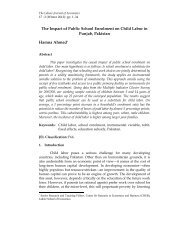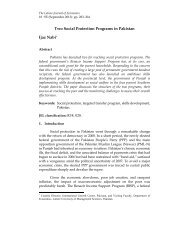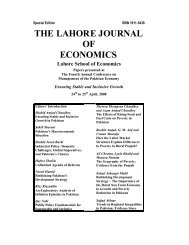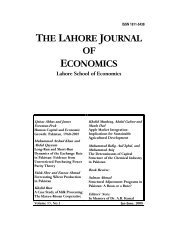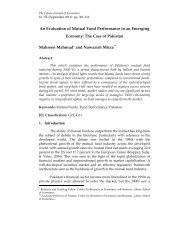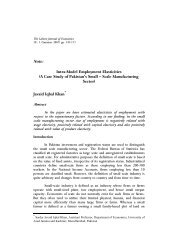Special Edition-07.pdf - Lahore School of Economics
Special Edition-07.pdf - Lahore School of Economics
Special Edition-07.pdf - Lahore School of Economics
You also want an ePaper? Increase the reach of your titles
YUMPU automatically turns print PDFs into web optimized ePapers that Google loves.
Reforming the Government in Pakistan: Rationale, Principles & Proposed Approach 3<br />
and responsive institutions for implementation. But unfortunately, we are at<br />
present caught in a difficult logjam. While the economic reforms themselves<br />
create dislocation and displacement in the transition period, strong working<br />
institutions provide the wherewithal and armory to withstand these shocks<br />
thus minimizing the costs <strong>of</strong> adjustment and maximizing the benefits to the<br />
poor and neglected. The urgency to build strong institutions to implement<br />
these structural reforms is therefore quite obvious.<br />
Following this logical sequence the various organs <strong>of</strong> the State –<br />
executive, judiciary and legislature – have to be assessed and evaluated to<br />
determine whether they are capable <strong>of</strong> meeting this new challenge or<br />
whether they need to be re-vamped to develop new capabilities and build<br />
up new response capacity. The task assigned to the National Commission for<br />
Government Reforms (NCGR) is limited to a review and examination <strong>of</strong> one<br />
<strong>of</strong> the organs <strong>of</strong> the State i.e. the Executive branch. The Commission has<br />
been asked to assess whether the government, its structures, processes and<br />
human resources can keep up with these new demands or need modification<br />
or alteration.<br />
(B) Lessons from other Developing Countries<br />
The role and limitations <strong>of</strong> governments in various developing<br />
countries have been analyzed at great length. The majority view is that<br />
governments should do what they are capable <strong>of</strong> doing better than in the<br />
past. A strong and effective government is needed rather than a weak and<br />
expansive government. The all wide-encompassing government has become<br />
too cumbersome and centralized with overlapping and competing interests,<br />
inefficient and unresponsive to the emerging needs <strong>of</strong> the public. Civil<br />
servants are poorly trained, sub-optimally utilized, badly motivated and<br />
ingrained with attitudes <strong>of</strong> indifference and inertia. It has been argued by<br />
development economists 1 that effective government in developing countries<br />
is not only necessary due to abundant market failures but possibly even<br />
sufficient to achieve economic development.<br />
A number <strong>of</strong> developing countries have successfully reformed their<br />
governments and tackled the market failures as well as achieved rapid<br />
economic development. How have they been able to transform the expansive<br />
government into a well focused, well functioning and result oriented<br />
effective government? The interpretation <strong>of</strong> the success <strong>of</strong> East Asian<br />
countries such as the Newly Industrializing Countries (NICs), ASEAN<br />
countries and China is a matter <strong>of</strong> serious debate among development<br />
economists. Neoclassical economists attribute the success to market friendly,<br />
private led growth and openness to trade with the governments providing



